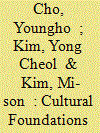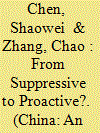| Srl | Item |
| 1 |
ID:
156650


|
|
|
|
|
| Summary/Abstract |
While post-development theory is very concerned with the ways in which development has impacted upon the countries of the Global South, there has been relatively little written on post-development theory from an African perspective. This paper identifies some of the ways in which post-development theory fails to adequately understand the African experience of development. In particular, I explore the difficulty that post-development theory confronts when faced with the continued desire on the part of many people in Africa for development. In his introduction to the new edition of The Development Dictionary, Wolfgang Sachs discusses this desire, noting that despite development’s many failures, many still associate the concept with self-affirmation and redress. He explains this continued desire for development as being indicative of the need for the decolonisation of the imagination. In this paper, I show some of the problems with this explanation and present alternative ways of understanding the persistence of the desire for development in Africa.
|
|
|
|
|
|
|
|
|
|
|
|
|
|
|
|
| 2 |
ID:
164967


|
|
|
|
|
| Summary/Abstract |
This study takes a cultural approach to examine the unstable and contentious nature of Korean democracy. Analyzing an original nationwide survey conducted in 2015, we find that the democratic and participatory culture of the Korean people underlies Korean democracy. This finding suggests substantial tension between the participatory orientation of the public and Korean representative democracy.
|
|
|
|
|
|
|
|
|
|
|
|
|
|
|
|
| 3 |
ID:
167919


|
|
|
|
|
| Summary/Abstract |
Scholarship today asserts that the Chinese Party-state's media control strategy with regard to popular protests has changed from suppressive to proactive. Nevertheless, existing literature tends to regard the Chinese state as a monolithic and unitary actor, and neglects the heterogeneity in different levels of government in handling protests. This article attempts to make a modest contribution to the literature by viewing the Chinese state as heterogeneous and multilayered actors with respect to popular protests. The authors contend that due to the distinctive incentives as well as the context factor "hierarchical government trust", lower-level authorities, especially the local ones, have a lower tendency to adopt a proactive approach to controlling media coverage of protests than their central counterparts. The authors utilise the Wukan incident as a case study to corroborate their argument, and identify the specific strategies that various levels of the governments have adopted.
|
|
|
|
|
|
|
|
|
|
|
|
|
|
|
|
| 4 |
ID:
153408


|
|
|
|
|
| Summary/Abstract |
Bystanders who were not stakeholders had often been mobilized into popular protests in China. Why did these bystanders step in to some protests and choose not to participate in other protests? What were the motivations and mobilizing mechanisms that brought the bystanders into the protests? Based on the case study of the Shishou Unrest in which about 70,000 bystanders were effectively mobilized to step into protests, this article reveals a two-stage mobilization strategy that the stakeholders started by turning a small number of bystanders into activists and then to mobilize more, other bystanders into protests. During the first mobilization stage, the stakeholders provided material incentives to the bystanders. During the second stage, activists appealed to the bystanders’ perception of extraordinary injustice related to the triggering event and the local society as a whole. The two-stage mobilization strategy successfully led a large number of bystanders step into the Shishou Unrest.
|
|
|
|
|
|
|
|
|
|
|
|
|
|
|
|
| 5 |
ID:
111542


|
|
|
|
|
| Publication |
2012.
|
| Summary/Abstract |
The dramatic events of the Arab Spring have changed the political landscape in Africa and showed up both the need for and the shortcomings of the African Union. The author looks at the impact of the past year on security issues across Africa.
|
|
|
|
|
|
|
|
|
|
|
|
|
|
|
|
| 6 |
ID:
106201


|
|
|
|
|
| Publication |
2011.
|
| Summary/Abstract |
The disproportionate use of force by government paramilitary units against the 12 April 2011 pro-democracy demonstrations in Africa's last absolute monarchy, Swaziland, underlined the monarchy's flawed approach towards addressing popular dissent. The consequences of economic mismanagement by the government of King Mswati III are becoming dire and can no longer be quelled by political repression. The uprising was inspired by the revolutions in North Africa on the one hand and was the result of many years of relentless campaigning for the restoration of multiparty democracy led by banned opposition parties on the other. It would be a mistake to write off the significance of the uprising, which has consolidated a platform for democracy advocates in the country as well as opened up possibilities for ushering in change in the country's political landscape. In this paper, it is argued that the prospects for change in Swaziland will be determined by the degree of unity in the political agenda and strategy within the movement comprising trade unions, political parties and civil society organisations; broad-based mobilisation in much of the country's rural areas and political buy-in of the reform agenda by pro-monarchists; and a sustained momentum for change from Swaziland's neighbours and other key African and international partners.
|
|
|
|
|
|
|
|
|
|
|
|
|
|
|
|